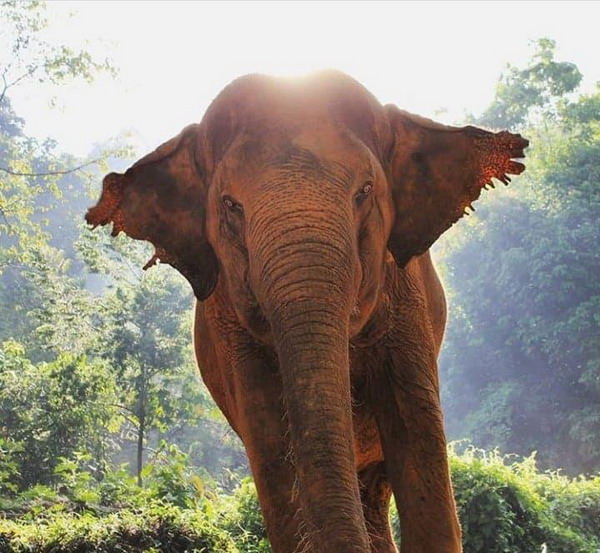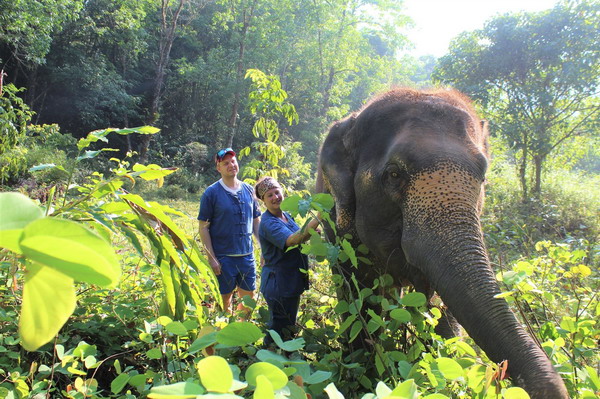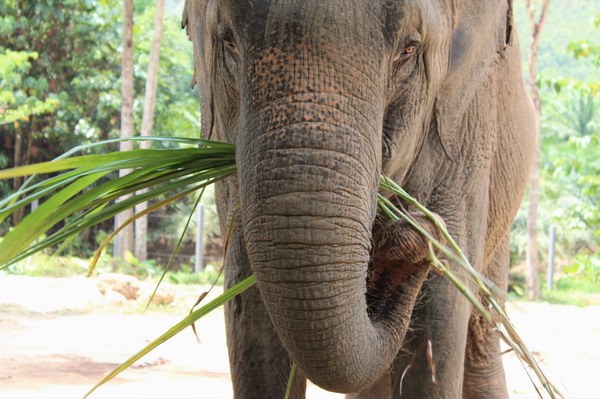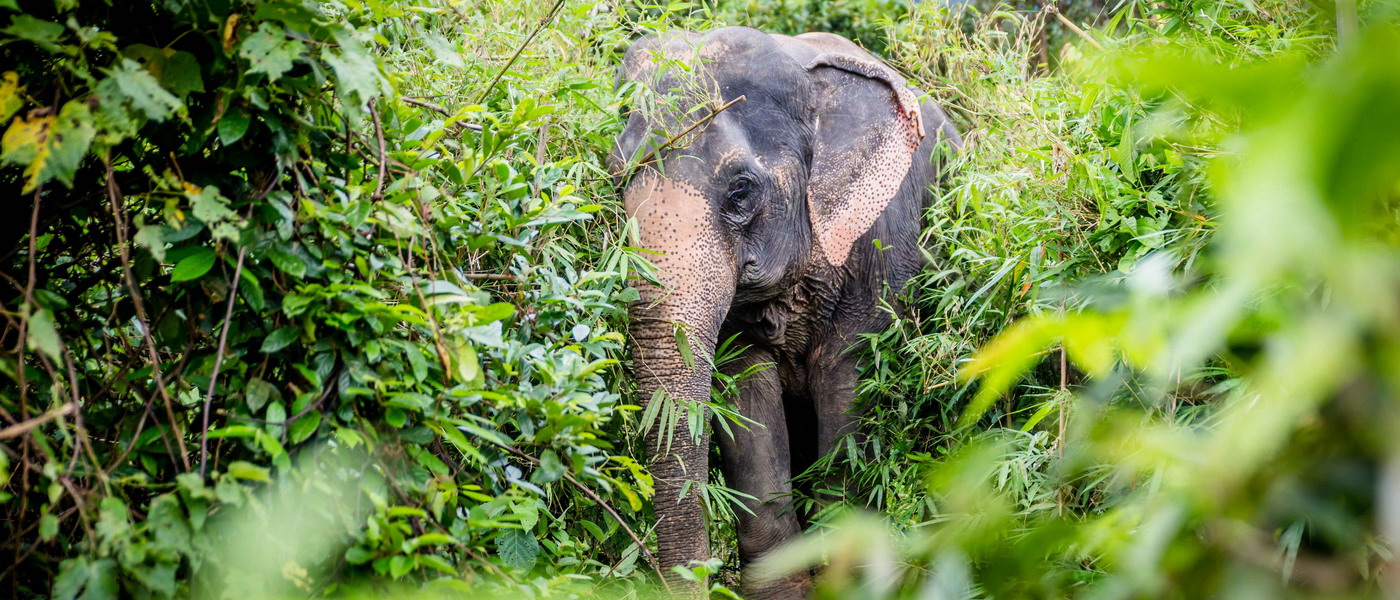Elephants have always played an important role throughout Thailand’s history and it is little wonder, therefore, that this amazing creature was chosen as the official national symbol of Thailand. It is not only their major contributions to past endeavours that have led to this revered status, but also their durability, strength and longevity. It is nearly impossible to have a holiday in Thailand without encountering an elephant and we have found that our guests at The Sarojin are always keen to learn more about these magnificent animals and the work we do with elephant organisations and programmes which ensure their good health and well-being.
 One such organisation is the Phang Nga Elephant Park, which is a small, unique, family-run eco-park which was established in 2015 and dedicates its time and efforts into providing elephants with the highest quality of life possible. Animal welfare is at the heart of the ethos of the Phang Nga Elephant Park whose team believe that education and the commitment to achieve maximum levels of care and husbandry are the best way to help save the Asian elephant. The elephant must always come first and it is the Park’s mission to be a role model for education and high animal welfare standards.
One such organisation is the Phang Nga Elephant Park, which is a small, unique, family-run eco-park which was established in 2015 and dedicates its time and efforts into providing elephants with the highest quality of life possible. Animal welfare is at the heart of the ethos of the Phang Nga Elephant Park whose team believe that education and the commitment to achieve maximum levels of care and husbandry are the best way to help save the Asian elephant. The elephant must always come first and it is the Park’s mission to be a role model for education and high animal welfare standards.
The Sarojin has worked with the Phang Nga Elephant Park since it opened in 2015 with both sharing the same views on animal welfare and sustainability. The Park cares for 10 elephants, most of which are owned by the family, with others being owned by friends and associates who meet their exacting standards of welfare and husbandry. All their programmes are ethical and it is important that visitors to the park engage safely with these gentle giants and develop unforgettable memories and relationships.
The Founder and Managing Director of the Phang Nga Elephant Park is Khun Jakrapob Thaotad, who founded it together with his cousin, Khun Sitthisak Songkaw (Lek) in 2015, who has worked with elephants all his life. Here Khun Jakrapob explains what guests from The Sarojin can experience when visiting the Phang Nga Elephant Park:
 “We offer four programmes at the park. These include a Special Introduction to the Asian Elephant; a Dawn and Dusk experience, where visitors can view elephants in their natural environment and participate in their feeding, watch them being bathed and health checked; an Elephant Care Experience and a Family Experience, which focusses on younger visitors. In each of the programmes we aim to educate our guests on the elephant mahout (Kwan Chang)’s daily routine and health checks, and we also explore the jungle and prepare organic food which is then fed to the elephants by the guests.
“We offer four programmes at the park. These include a Special Introduction to the Asian Elephant; a Dawn and Dusk experience, where visitors can view elephants in their natural environment and participate in their feeding, watch them being bathed and health checked; an Elephant Care Experience and a Family Experience, which focusses on younger visitors. In each of the programmes we aim to educate our guests on the elephant mahout (Kwan Chang)’s daily routine and health checks, and we also explore the jungle and prepare organic food which is then fed to the elephants by the guests.
We wish for our visitors to have a unique experience that is not only enjoyable, but also educational. We want them to leave the Park knowing more about the importance of good health and welfare and also to understand the key role that the elephant plays in Thai society.
Our English guides are trained to explain all the aspects of husbandry used to care for our elephants and we have an Education Centre and a substantial section of our website dedicated to providing education on elephants, their health, welfare and management.”
 Each of the elephants has its own distinct personality and its own mahout (Kwang Chang) who dedicate their lives to these incredible animals, often at the cost of a family life. They become life partners, establishing an intimacy and mutual trust with their elephants, which makes them able to easily detect when the elephant is ill or in need of help. One such bond is demonstrated between Lek and his elephant, Choosri, who have been together for over 35 years and know each other inside out. Choosri is the oldest animal at the Park, at 49 years’ old, and is one of the most gentle giants you could ever care to meet. Her name means “Goodness” and the team are very proud of her long-standing position and status in the family. The mahouts wash their elephants with only the vine of the Ceiba tree, a plant that has been used for medicinal purposes for centuries. When softened with a hammer and combined with water, it lathers up to a natural soap that is ideal for an elephant’s skin. Instinctively, some elephants will seek out the Ceiba and eat it.
Each of the elephants has its own distinct personality and its own mahout (Kwang Chang) who dedicate their lives to these incredible animals, often at the cost of a family life. They become life partners, establishing an intimacy and mutual trust with their elephants, which makes them able to easily detect when the elephant is ill or in need of help. One such bond is demonstrated between Lek and his elephant, Choosri, who have been together for over 35 years and know each other inside out. Choosri is the oldest animal at the Park, at 49 years’ old, and is one of the most gentle giants you could ever care to meet. Her name means “Goodness” and the team are very proud of her long-standing position and status in the family. The mahouts wash their elephants with only the vine of the Ceiba tree, a plant that has been used for medicinal purposes for centuries. When softened with a hammer and combined with water, it lathers up to a natural soap that is ideal for an elephant’s skin. Instinctively, some elephants will seek out the Ceiba and eat it.
Ethical elephant tourism is of paramount important to both the Phang Nga Elephant Park and The Sarojin and our guests and visitors often return home feeling educated and mesmerised by these magnificent animals, which the Thai people hold so dearly in their hearts.
For more information on the Phang Nga Elephant Park, please visit their website and Facebook page.
More information on The Sarojin’s excursions, please visit our Adventures and Discoveries brochure:
https://www.sarojin.com/wp-content/uploads/2020/11/TS_AD_Menu2020.pdf













